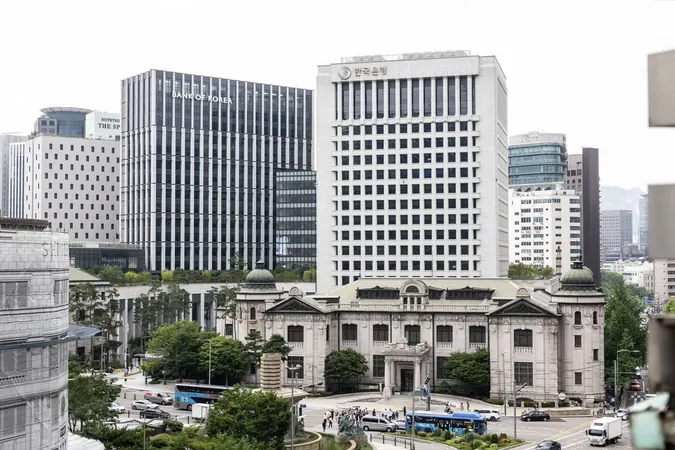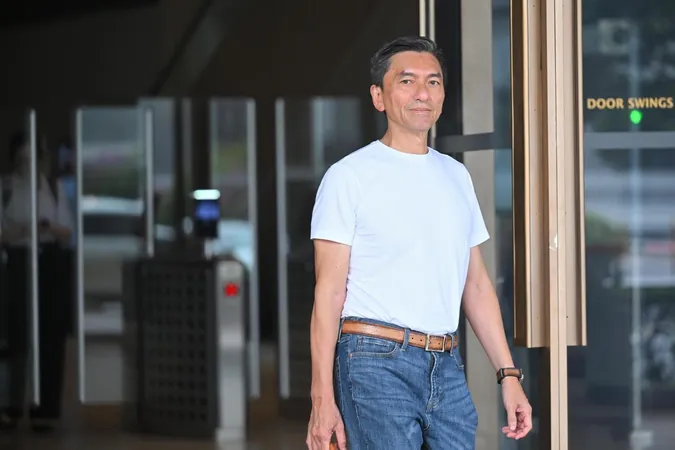
South Korea's Inflation Surges, Prompting Bank of Korea to Consider Policy Pause
2025-04-02
Author: Wei Ling
In a surprising turn of events, South Korea’s consumer inflation has picked up pace, driven by the weakened won which has increased import costs significantly. This surge in inflation gives the Bank of Korea (BOK) a reason to pause its monetary easing strategy when policymakers convene later this month.
According to data released by the statistics office, consumer prices climbed 2.1% in March compared to the same month last year, marking an increase from February's inflation rate of 2%. This development caught economists off guard, as predictions had anticipated a drop to 1.9%. Core prices, which exclude volatile items like food and energy, also saw an increase, rising by 1.9%.
The significance of this inflation data is heightened as South Korea grapples with potential trade impacts from U.S. tariffs under President Donald Trump's administration. Ahead of the BOK's monetary policy meeting scheduled for April 17, the central bank must carefully evaluate the economic landscape, especially the ramifications of recent rate cuts and global trade tensions. Most analysts believe the BOK is likely to hold rates steady as they assess the long-term effects of these economic policies, although some anticipate a possible rate adjustment next month if the impact of protectionist measures becomes clearer.
In a statement, the BOK emphasized the need for vigilance regarding future inflation trends, noting the significant uncertainties stemming from fluctuations in exchange rates, oil prices, and domestic demand. The won, having been the worst-performing major currency in Asia last year, continues to exert upward pressure on prices for imported goods, including food and energy.
Service costs rose 2.3% year-on-year while product prices increased by 1.7%. Notably, prices for imported beef surged by 5.6%, outpacing the overall food price increase of 2.4%. Meanwhile, petrol prices have also seen a rise, further straining household budgets.
Amid these inflationary pressures, the BOK has already implemented three rate cuts since shifting its policy stance last October. The South Korean government is working on an additional budget of 10 trillion won (approximately S$9.2 billion) to fortify the economy against trade risks, particularly following the devastating wildfires that struck the region. Additionally, measures to support the automotive sector are expected to be announced soon.
Economist Ha Keon-hyeong from Shinhan Securities advised that the BOK's current priority should be the economic slowdown. With limited options for further rate cuts, maintaining some policy flexibility for future fiscal measures will be essential.
Adding to the economic uncertainty, President Yoon Suk-yeol's short-lived declaration of martial law in December has left lingering effects on consumer and business confidence. In February, retail sales growth slowed to just 4.4%, down from an impressive 11.7%, indicating a tightening consumer sentiment, which dipped further to a measurement of 93.4 in March, down from 95.2.
As the situation develops, all eyes will be on the Constitutional Court's decision this Friday regarding President Yoon's political fate, which could have profound implications for national stability.
Despite the challenges, South Korea’s exports showed signs of resilience, rebounding in March with notable increases in semiconductor shipments—up by 11.9%—reflecting robust demand for high-value technology products. As the nation navigates this complex economic landscape, the central bank and government will continue to implement strategies to bolster growth and stabilize the economy against external pressures.



 Brasil (PT)
Brasil (PT)
 Canada (EN)
Canada (EN)
 Chile (ES)
Chile (ES)
 Česko (CS)
Česko (CS)
 대한민국 (KO)
대한민국 (KO)
 España (ES)
España (ES)
 France (FR)
France (FR)
 Hong Kong (EN)
Hong Kong (EN)
 Italia (IT)
Italia (IT)
 日本 (JA)
日本 (JA)
 Magyarország (HU)
Magyarország (HU)
 Norge (NO)
Norge (NO)
 Polska (PL)
Polska (PL)
 Schweiz (DE)
Schweiz (DE)
 Singapore (EN)
Singapore (EN)
 Sverige (SV)
Sverige (SV)
 Suomi (FI)
Suomi (FI)
 Türkiye (TR)
Türkiye (TR)
 الإمارات العربية المتحدة (AR)
الإمارات العربية المتحدة (AR)